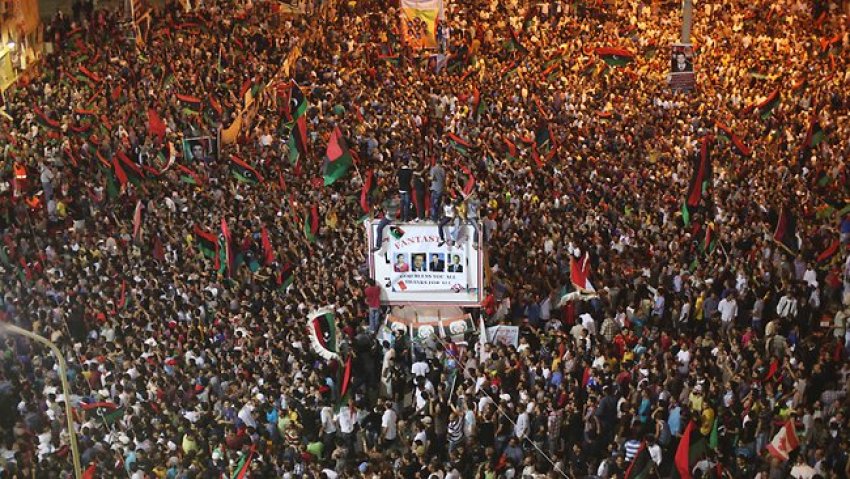
There will be no tears for the end of the Gaddafi regime, if that is indeed what we are watching.
The Gaddafi regime was a brutal dictatorship and it deserved to be overthrown just as much as that of Ben Ali’s in Tunisia or Mubarak’s in Egypt.
But, unlike the defeat of Ben Ali or Mubarak, the end of the Gaddafi has not been brought about mainly by a popular revolutionary rising.
It has been brought about by a military victory in a civil war in which the rebel side has become largely dependent on western military fire power.
So the question now posed is this: in whose interest will the new rulers of Libya act?
NATO is already saying that it will work with the Benghazi-based Transitional National Council. This, more of a threat than a promise, should be no surprise.
The point of the western intervention in Libya was to gain a foothold in the fast moving Arab revolutions and to create a compliant regime by making it militarily and economically dependent on the west in a way in which, say, the Tunisian unions or the Youth Coalitions of Egypt could never be said to be.
So the major powers will be looking for payback.
They will want an Arab regime which is a home for western military bases. They will want a regime that is supportive of Israel (and the TNC has already made supportive statements in favour of the ‘war on terror’).
And they will want a Libya that is safe for BP, Shell and other western corporations, whether from the oil industry or elsewhere.
The US, Britain and France will be making the most of the refurbishment of the "humanitarian intervention" argument.
This was first used in the Balkan War of the late 1990s but was comprehensively disgraced by its exposure as a fraud in the Iraq and Afghan wars. Now Syria and others can expect this cover for western imperial goals to gain a renewed lease of life.
The Palestinian cause, up to now a beneficiary of the Arab Spring, will face a more confident enemy if the major powers are strengthened ideologically by the fall of Gaddafi.
In the Western countries we should immediately demand that the imperial powers live up to their own propaganda: Cameron, Sarkozy and Obama all said that this operation was simply about saving civilian lives.
The course of military operations proved this false. But, nevertheless, the NATO powers should now get out of Libya.
Their task, by their own definition, is over.
It should be left to the Libyan people to determine their future. William Hague, the British Foreign Secretary, has talked of sending troops to "keep the peace" in Libya.
That should never happen: Iraq surely shows us the kind of failure that awaits any such scheme.
These aims of the Western powers may be hard to realise since although the TNC has become the creature of the imperialists it is by no means a stable entity.
Indeed the pressures within it created by western tutelage resulted in a bloody feud in which the military commander of the rebels was killed only a few weeks ago.
And there is some sentiment among rebel supporters in Benghazi that the western powers need to go as soon as Gaddafi has been defeated.
Dima Khatib, one of the best commentators on the Arab Spring, reported from Benghazi a few weeks ago. She recorded this interchange:
"The sign behind her reads: Thanks France. As I was taking a photograph of it, a woman came up to me in Benghazi's version of Tahrir Square and said: 'We are all Sarkozy'.
"I said: 'Oh really? What do you think of Sarkozy suggesting that Gaddafi resigns but stays in Libya?'
"She did not even think for a minute before she said: 'No No... That is none of Sarkozy's business. Gaddafi's fate is our business, us, the Libyan people'.
"Another lady hurried towards me to say: 'We thank the US and France for what they are doing. But they have no say here in things. They should just give us the air cover we need to march to Tripoli.
"'We Libyans will do it ourselves. We shall liberate Libya from the tyrant and we Libyans shall decide his fate'."
Of course, such sentiments considerably underestimate the persistence of the imperial powers. They are like unwelcome dinner guests -- very easy to invite, very hard to get to leave.
But still this mood is a factor that persists from the earliest days of the revolution when "We can do it alone, no western intervention" billboards were seen across Benghazi.
It will make life more uncertain for any future pro-Western regime in Tripoli.
And there is one other unpredictable effect. The Western powers may get the regime they want in Libya, but the fall of Gaddafi will be seen by many in the Arab world as another victory for the revolution.
This is an illusion because the main beneficiaries of the fall of Gaddafi will be the major powers and it will encourage them in further interventions in the Middle East.
But sometimes illusions have secondary positive effects.
And this illusion may encourage those who are fighting in Syria, Yemen, Bahrain and elsewhere.
In the coming weeks, the fate of the Arab revolutions will depend on how the balance of renewed imperial confidence and sustained revolutionary enthusiasm works itself out.
[Reprinted from British socialist website www.counterfire.org .]
Video: NATO tries to control Libyan revolution. The Real News Network.
Comments
Anonymous replied on Permalink
Anonymous replied on Permalink
Anonymous replied on Permalink
Anonymous replied on Permalink
Anonymous replied on Permalink
Anonymous replied on Permalink